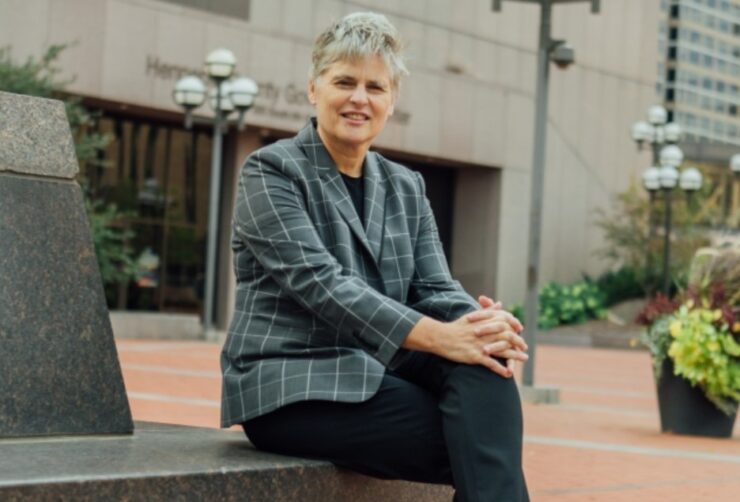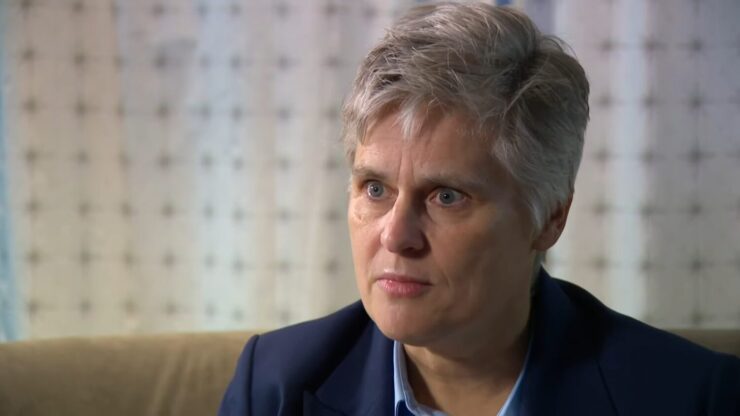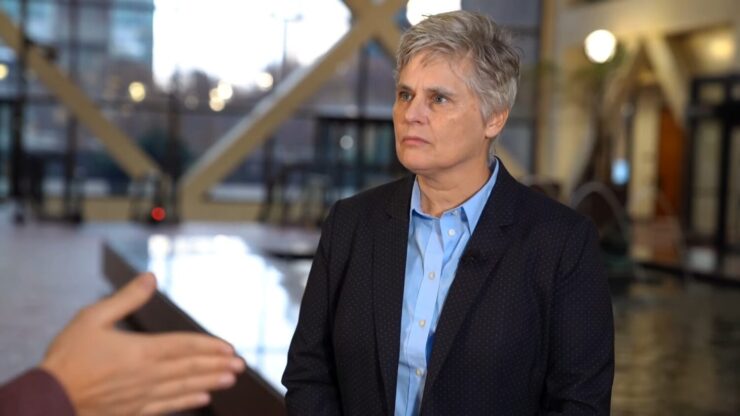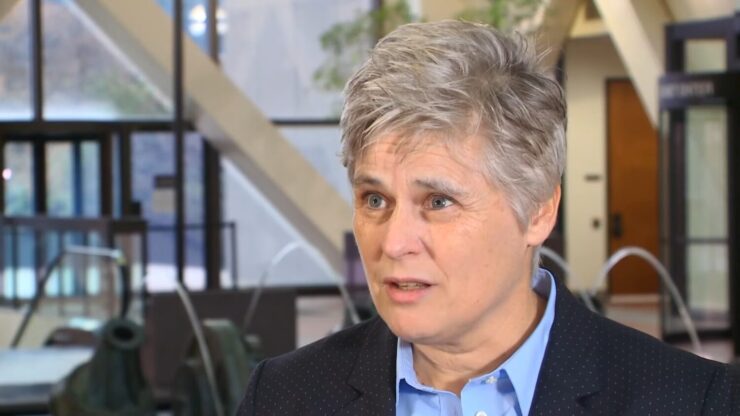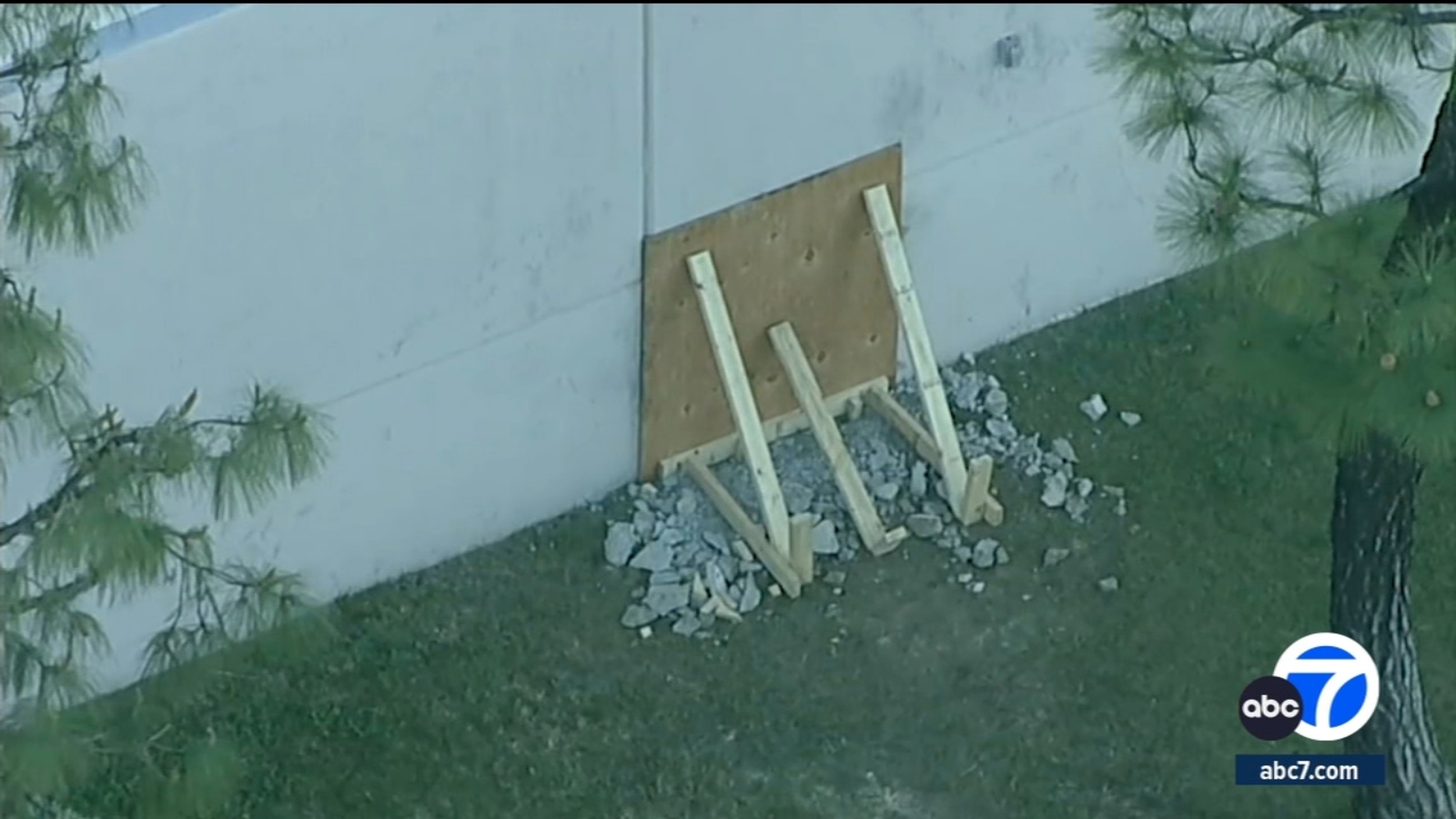This story was updated at 5:15 p.m. on Oct. 1 with details from the Sept. 30 Minnesota Board of Public Defense meeting in which the board voted to open Mary Moriarty’s position as Hennepin County’s chief public defender to other applicants.
As Hennepin County’s chief public defender, Mary Moriarty wishes her neighbors in the Armatage neighborhood could see what she sees. She’s watched her favorite client sentenced to life in prison. She’s watched hours of police bodycam video, calling the prosecutor if she sees something troubling. She’s read about the harm clients experienced as children.
“I tend to think of what’s happening here in Minneapolis as a reckoning for all of us about what we’ve neglected all of these decades,” she said. “This is going to define who we are. Are we going to buckle down and figure out how to fix things and make things better, or are we just going to go back to whatever normal is for our lives, because it doesn’t directly impact us?”
At the Public Defender’s Office where she has worked for 30 years, Moriarty has brought in social workers, added lawyer training, and advocated to ban traffic stops used as pretexts for investigations.
Her future is uncertain. The Minnesota Board of Public Defense voted 4-2 on Sept. 30 to open Moriarty’s position to other applicants, requiring her to reapply for the job. Board members said that while Moriarty is an excellent attorney and a strong advocate for social justice with broad community support, her relationship with the state has broken down.
The State Public Defense Board placed Moriarty on paid leave for three months late last year and issued a written reprimand for issues including an unclear delineation between personal and official social media accounts and “fractured” relationships with justice partners in the county and judicial branch.
While she was suspended, Moriarty volunteered at the Drake Hotel fire site, read books about racism, and traveled to Selma to march on the 55th anniversary of Bloody Sunday.
“I am accused of not getting along [and] being collaborative with my justice partners, who are primarily prosecutors. I don’t particularly view them as my justice partners as much as I view our community,” Moriarty said.
Groups like the Minnesota ACLU and activists like Valerie Castile are mobilizing in support of Moriarty. She’s hopeful the board will reappoint her based on the office’s success. A 2019 report by the National Center for State Courts said Hennepin public defenders are as successful as privately retained attorneys in achieving favorable outcomes for their clients. And Hennepin’s “holistic” defenders, who team with social workers, receive sentences four months shorter than clients of private attorneys.
Table of Contents
ToggleLearning
Growing up in New Ulm, Moriarty was convinced she never wanted to be a lawyer, because it seemed “boring.” But she was steeped in the profession. Her father, Patrick J. Moriarty, served as an assistant public defender in the Fifth Judicial District for more than 20 years.
She visited the jail with her father, she knew the police officers, and her classmates were her father’s clients. She used a Hardy Boys recipe for fingerprint powder to dust her parents’ wine glasses and lift their fingerprints with tape.
“We’d be running errands around town, and my dad would have cassette tapes about the 10 commandments of cross-examination,” she said.
She briefly considered journalism, covering county fairs for the New Ulm Journal, but decided to enroll in law school at the University of Minnesota. She was thrilled to discover that one of her professors was Irving Younger, the expert on those old cassette tapes.
Moriarty clearly remembers her first juvenile detention case as a public defender. Her supervisor abandoned her after about 10 minutes.
“I didn’t know how to get the kid from the detention center to the courtroom. I didn’t know where to find the police reports,” she said.
With that experience in mind, Moriarty said she tries to give ample training to new lawyers and provide continuing education each week over the lunch hour. She aims to help lawyers become experts in forensic science, including DNA evidence and fingerprint analysis. Her training extends nationwide, teaching at the University of Minnesota, the nonprofit Gideon’s Promise and the National Criminal Defense College. She tries to encourage young lawyers.
“You may be the first person that’s actually advocated for that client, so you have to look at those day-to-day successes and remember those because sometimes you feel as though you’re beaten up, you feel that you’re not getting what your client deserves,” she said.
Working
Moriarty oversees about 120 public defenders who handle roughly 38,000 cases per year.
“No matter how many cases you have, you still feel that you don’t have enough time,” she said.
As a young lawyer, Moriarty worked on a fifth-degree possession case that went to the U.S. Supreme Court. The court’s unanimous opinion said although warrantless drug seizure is permitted during a lawful pat-down search, the officer’s search in the case went beyond what was necessary to find a weapon.
But that’s not the case she thinks about most often.
“I have one case that’s always stuck with me — not because I’m proud of it,” she said.
That’s the case of Dameion Robinson, which she lost. Robinson was sentenced to life in prison for the 1997 murder of a man parked at St. Thomas Episcopal Church in the Regina neighborhood.
Moriarty explained that in the midst of the “Murderapolis” era, Robinson was convicted on the basis of a robbery case where the same gun was used, although he was later acquitted of the robbery. The case involved evidence that appeared to be planted, she said.
“That’s a case I’ll never forget because I truly believe he would never be convicted today,” she said.
Robinson wrote a letter to Centurion, which works to overturn wrongful convictions, and the nonprofit is reinvestigating the case. Transferred to a prison in Oregon, Robinson’s first visitor in seven years was Centurion, said Legal Director Paul Casteleiro. He said the search for new evidence will be time-consuming.
“You’ve got to put the pieces back together and you’ve got to find out where the truth lies,” he said.
Stay updated on the newest news on the Minneapolis election results!
Reforming
Taking inspiration from a tour of the Red Hook community court in New York, Moriarty’s office started bringing social workers to misdemeanor cases to offer alternative solutions. She said the concept is best suited for “livability” offenses like trespassing and aggressive begging where jail time doesn’t solve the problem. The practice evolved into the new “Restorative Court,” but initially it was a hard sell, she said.
“So our office and the city attorney’s office just did it,” she said. “I do think that’s more the wave of the future, where we understand that the majority of the clients we see do have issues with addiction and mental health. And that really addressing those issues is really what’s going to keep them out of the court system in the future.”
Social workers also help prepare personal histories, so a judge can see a full picture of each client, beyond a criminal complaint.
“There is so much trauma in the histories of clients,” Moriarty said. “How do we help the next kid not get to that point?”
She notes that communities of color are hardest hit by recent violent crime.
“If 100 people had been shot in Armatage, this would be a public health crisis. We would figure out what’s happening here and we would do something about it,” she said.
Moriarty has called her office the “disparities watchdog for the public safety line of business.” Office analysis in recent years included a public data request that generated a 19,000-line spreadsheet on Minneapolis traffic stops. Police stops for equipment violations between June 2017 and May 2018 yielded searches where nearly 75% of those searched were Black, Moriarty reported. Her office found that white drivers had drugs or guns at slightly higher rates than Black drivers, and police “hit rates” getting guns were less than half of 1%.
To Moriarty, that means investigatory traffic stops are not an effective use of resources and are particularly harmful for Black drivers, straining relations with police and potentially creating dangerous situations. Traffic violations should be handled in a different way, she said, and police shouldn’t ask drivers to voluntarily allow searches of their cars. That’s what she’s suggesting as a member of the mayor’s task force on public safety.
“To me, that’s how we prevent the next Philando Castile,” she said.
Recent analysis by the office shows that Black people are very disproportionately charged with obstruction of justice. There are about 300 fewer people at the Hennepin County jail, some released to avoid crowding during the pandemic, and the office is tracking any new offenses while defendants are not in custody.
“We can argue about bail and why people shouldn’t be in until we’re blue in the face. This really gave us an opportunity to look and see what really happens when people that prosecutors and judges think should be in are out,” she said.
Fighting
The Minnesota Board of Public Defense hired an outside investigator that interviewed more than 30 people and interviewed Moriarty for five hours in February. The resulting letter of reprimand ordered Moriarty to Mary Moriarty – Reforming with justice partners and work with the state board on any official social media posts.
The state’s chief public defender, William Ward, recommended that Moriarty not be reappointed. He wrote that she is a gifted litigator and advocate, but that doesn’t make up for problems with management and working relationships. Her combative comments in the press generate mistrust and make it harder to work together to improve the system, according to stakeholders Ward cited in his memo.
“We need a professional working relationship,” Ward said at the Sept. 30 board meeting. “I have stakeholders telling me they don’t trust you. They don’t trust being in the same room with you, because you basically throw a hand grenade and then walk out the door without a solution. … Ultimately, my goal always is to protect this board.”
One issue related to Moriarty’s budget discussion with the Hennepin County board in fall 2019, where Moriarty and commissioners called the state’s takeover of the public defender’s office a “failed experiment.” Moriarty said that despite a recent funding increase, public defenders paid by the state were still making about $10,000 less than prosecutors paid by the county. The letter of reprimand required Moriarty to work with the state on future presentations.
State Public Defense Board chair Anna Restovich Braun questioned Moriarty’s honesty in providing the proper release to share client information on social media, and questioned her accountability in moving forward with job offers during a state hiring freeze.
“This all started when more than one of the employees in Mary’s office came forward to Bill [Ward] and Kevin [Kajer, the board’s chief administrator] with complaints and concerns, which they deemed serious enough to bring to the board’s attention. I don’t want that to get lost in here,” said board member Helen Meyer, who later changed her vote to support Moriarty.
While some office managers said they appreciate Moriarty’s open door and dedication, others complained Moriarty is slow to make decisions and said she’s more concerned with the fight and the glory than with day-to-day operations, according to Ward’s memo.
At Wednesday’s meeting, Ward said the concerns are not about Moriarty’s advocacy on racial justice.
“There are ways to be an effective advocate and present a position forcefully, but with tact,” said board member Herb Kroon. “There are times when Ms. Moriarty went over the line.”
Moriarty said her criticism can anger justice partners, but it’s the only way to make the system better. For too long, the actions of prosecutors, judges and county officials have flown under the radar because the public doesn’t understand the roles they play, she wrote to the board.
She alleged a double standard, pointing to another chief public defender who was celebrated for speaking to the press. And she said Ward has bullied and harassed her for years, often calling her “young lady.” Ward responded that allegations of gender bias are “utterly untrue.”
Board member Eli Darris, who noted he was speaking as a former public defense client who lives within walking distance of George Floyd’s memorial, unsuccessfully tried to table the vote to give time for public input and mediation between Ward and Moriarty. He said the public defender’s primary job is to provide excellent legal defense, which means they aren’t always going to make friends on the other side. By Darris’s count, the board received 175 letters in support of Moriarty, including 50 letters from Moriarty’s staff.
In a September essay, staff at the Minnesota ACLU praised Moriarty’s 2018 exposure of racial disparities in low-level marijuana arrests, which prompted the mayor to end the stings.
Valerie Castile urged supporters in September to contact the board, saying: “Public Defenders Who Actually Give A Damn and Who WILL FIGHT FOR YOU, Not Plead You Out !! Let’s HELP HER!! WE NEED PEOPLE In Those OFFICES THAT CARE!!”
In public testimony at the board meeting, staff praised Moriarty for dropping everything to help a stressed attorney prepare for trial, advocating for pay parity on behalf of burned-out attorneys who lose colleagues to the better-paid county attorney’s office, and improving the reputation of the office among marginalized communities. One speaker said they no longer hear the phrase “public pretenders.”
“I’d like to thank you for advocating for Black people in this community,” said Latonya Reeves of the Hennepin County Probation Office. “I want to thank you for being that voice. As John Lewis said: ‘Good trouble, necessary trouble.’”
Board member Duchess Harris, who needed to leave the meeting before the vote, said she’s concerned that Moriarty hasn’t received a standard performance evaluation in six years, a point that swayed Meyer to change her vote in favor of Moriarty.
“Performance reviews are not the same as investigations,” Meyer said.
Although her tenure is still uncertain, Moriarty said she is optimistic about the future. That’s partly due to the rise of smartphones and police bodycams, ensuring that client complaints about mistreatment don’t fall on deaf ears.
“Where would we be with George Floyd if we didn’t have video?” she asked.
She said people in the right positions are really trying to make change. And George Floyd died in Minneapolis, making it harder for locals to look away.
“We have to figure out how to live with this discomfort and really figure out how to make true change and reform, otherwise we’re going to see this happen over and over,” she said. “This is really our reckoning for who we are and what we’re going to do about it.”

